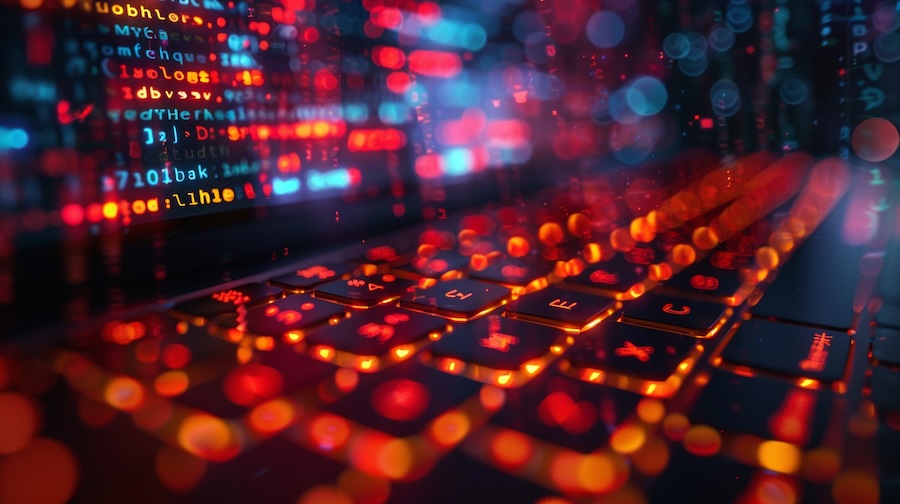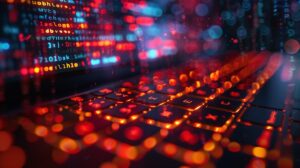We have created the “Coding Future Trends: What to Expect in Software Development” blog post for the EU-Funded Code For Future Project (reference number: 2022-3-DE04-KA210-YOU-000092666).
Xient GmbH coordinates the project with L4Y Learning for Youth GmbH and Seyhan Danisment Gazi Anadolu Lisesi.
During this project, we will share more content regarding coding, which you can check through this link.
Coding Future Trends: Learning Objectives
- Grasp the pivotal role of advanced technologies like AI, ML, quantum computing, and blockchain in shaping the future of software development and creating new career paths.
- Learn how to enhance coding skills with AI and ML technologies, understand their application in automated tools and predictive systems, and familiarize with key programming languages and platforms such as Python, R, TensorFlow, and PyTorch.
- Explore diverse career opportunities within AI and ML fields, including AI/ML engineering and data science, and also understand the importance of roles in AI ethics and governance.
- Recognize the transformative potential of quantum computing in solving complex problems and also the application of blockchain technology beyond cryptocurrencies to enhance software development.
- Assess the growing relevance of IoT and edge computing, and explore the transformative effects of AR and VR technologies across various sectors, preparing for their impact on future coding practices and industry standards.
Coding Future Trends: Introduction
In this comprehensive module, we will explore the vanguard Coding Future Trends that are sculpting the future of software development. The adoption and integration of cutting-edge technologies such as artificial intelligence (AI) and machine learning (ML), alongside revolutionary fields like quantum computing and blockchain, are heralding a transformative era. These technological advancements are not merely revolutionizing how software is built but are also pioneering new career paths in emerging fields like AI engineering and data science.
Most important, no matter your current level of expertise in coding, acquainting yourself with these groundbreaking trends is crucial. Also, this knowledge will empower you to stay updated on pivotal developments and ensure alignment with the evolving demands of the future labor market in coding and technology.
Advancements in Artificial Intelligence and Machine Learning
AI and ML Integration
Artificial Intelligence (AI) and Machine Learning (ML) fundamentally reshape the software industry. Their integration into diverse products and platforms also propels innovation and operational efficiency, catalyzing businesses to exceed their limits and uncover unprecedented opportunities. Consider the following enhancements:
- Automated Code Generation Tools: Leveraging AI-driven technologies such as GPT-4 and PaLM 2, these tools are revolutionizing programming by automating tasks such as code generation. Furthermore, these tools are invaluable in streamlining debugging, optimizing code, creating functional modules, and preparing comprehensive documentation.
- Predictive User Interfaces: These cutting-edge interfaces predict user needs and deliver personalized experiences tailored to individual preferences, significantly enhancing user efficiency and effectiveness. On the other hand, they provide crucial recommendations, save considerable time and effort, and seamlessly facilitate the achievement of user goals.
- AI-driven Testing and Debugging Tools: These tools specifically excel in identifying errors and operational glitches in software by recognizing patterns that may indicate potential issues. They swiftly suggest likely causes of bugs and propose actionable solutions, significantly accelerating the debugging process. Moreover, these AI-powered testing tools are adept at conducting tests on a grand scale, across various devices, platforms, and environments, ensuring thorough coverage and reliable detection of bugs and vulnerabilities.
Skills Development in AI and ML
In the rapidly evolving tech landscape, programmers find immense benefits in mastering AI and ML technologies. Gaining expertise in these domains not only enhances their coding capabilities but also opens up a multitude of opportunities within the tech industry. At this time, as AI and ML continue to revolutionize various sectors, from healthcare to finance, possessing a robust foundation in these technologies enables coders to contribute to sophisticated projects and solutions that require intricate problem-solving and predictive analytics. As a matter of fact, this knowledge positions them at the forefront of the competitive tech field, paving the way for advanced career paths and the capability to influence significant technological progressions.
- Python and R for AI and ML: Among the programming languages, Python stands out after all for its straightforward syntax, readability, and rich library ecosystem, making it an ideal choice for developing neural networks and predictive systems. R, on the other hand, excels in managing and analyzing large datasets and is equipped with powerful packages specifically designed for machine learning algorithms, making it highly suitable for complex AI applications.
- TensorFlow and PyTorch Platforms: TensorFlow, developed by Google, is an end-to-end open-source platform for machine learning. At this point, it offers a comprehensive, versatile ecosystem of tools and resources essential for constructing, deploying, and training ML models effectively. PyTorch, another open-source framework, combines the robust machine learning library of Torch with a Python-based high-level API, which offers flexibility and ease of use for developers looking to build sophisticated neural networks.
Career Opportunities in AI and ML
The technology sector offers a variety of roles for professionals skilled in AI and ML:
- AI/ML Engineer: These experts are tasked with developing applications and systems utilizing AI and ML techniques to enhance organizational efficiency and innovation. At this point, they are responsible for maintaining and upgrading existing AI systems, conducting experimental tests, analyzing performance data, and building robust machine learning models.
- Data Scientist: Data scientists also play a crucial role in the development and enhancement of AI systems. At this point, they collaborate closely with machine learning engineers and other data science team members on a variety of complex tasks including natural language understanding, machine translation, named entity recognition, question answering, topic segmentation, and automatic speech recognition.
- Roles in AI Ethics and Governance: These positions are critical for ensuring the responsible development and application of AI technologies. At this point, job titles in this category include AI Ethicists, who analyze the ethical implications of AI systems and establish guidelines for their responsible development and use, and AI Policy Analysts, who research and develop policies and regulations concerning AI governance, taking into consideration legal, ethical, and social implications.
Introduction to Quantum Computing and Its Impact
Quantum Computing is a cutting-edge technology that utilizes the principles of quantum mechanics to perform computations much faster than traditional computers. This technology uses quantum bits, or qubits, which can exist in multiple states simultaneously, thus enabling them to perform vast numbers of calculations at once. Quantum computing has the potential to revolutionize fields such as cryptography, drug discovery, financial modeling, and climate research by solving problems that are currently intractable for classical computers.
Blockchain Technology: Enhancing Software Development
Blockchain technology, often associated with cryptocurrencies e.g. Bitcoin, has applications far beyond this narrow scope. Also, its potential to create secure, decentralized applications (dApps) is revolutionizing software development by providing enhanced security, transparency, and efficiency. These dApps operate on a peer-to-peer network rather than a single server, dramatically reducing the risks associated with centralized data management. The implications for software development practices include improved data authenticity, quality assurance, and project management.
The Growing Importance of IoT Devices and Edge Computing
The Internet of Things (IoT) is transforming how physical devices interact and share information by connecting them to the internet. IoT devices are proliferating, requiring more efficient ways to handle vast data loads, Edge Computing not only addresses this need by processing data at or near the source of data generation., but this technology is also particularly useful in real-time applications that require immediate processing, such as traffic management systems, health monitoring devices, and smart security systems.
Transformative Effects of AR/VR Technologies
Augmented Reality (AR) and Virtual Reality (VR) are particularly reshaping various sectors by providing immersive and interactive experiences. These technologies are used in training simulations, customer engagement strategies, and entertainment, providing users with experiences that were previously impossible. For instance, AR can overlay digital information onto the real world, enhancing the way we shop, learn, and interact with digital content, while VR creates completely immersive environments, allowing for deep engagement in virtual settings.
Coding Future Trends: Conclusion
The dynamic landscape of Coding Future Trends continues to evolve from time to time, driven by AI, quantum computing, blockchain, IoT, and AR/VR technologies. By staying informed and acquiring relevant skills, you can also position yourself for success in the rapidly changing tech landscape. Moreover, these exciting new trends offer endless opportunities for innovation and are shaping the future of software development in profound ways.
Also, please follow our YouTube Channel, our Twitter and Instagram
Coding Future Trends: References
- Ishan Vyas. (2023, December 26). AI and Machine Learning Integration in SaaS Applications. Retrieved from https://www.computer.org/publications/tech-news/trends/ai-and-machine-learning-integration
- Chris Daily. (2023, November 1). Integrating AI in an Existing Product: What to Know and How to Do It. Retrieved from https://medium.com/the-ai-educator/integrating-ai-in-an-existing-product-what-to-know-and-how-to-do-it-1c48494d6ac1
- Tabnine Team. (2024, March 10). AI Code Generation: How It Works and 9 Tools You Should Know. Retrieved from https://www.tabnine.com/blog/ai-code-generation-how-it-works-and-9-tools-you-should-know/
- AI & Insights. (2023, February 11). Predictive User Interfaces: Using AI to Anticipate User Needs. Retrieved from https://medium.com/muthoni-wanyoike/predictive-user-interfaces-using-ai-to-anticipate-user-needs-7156ea9f6321
- Steve Coppola. (2024). Predictive User Experiences: How AI Anticipates User Needs and Enhances Interactions. Retrieved from https://www.inputux.com/post/predictive-user-experiences-how-ai-anticipates-user-needs-and-enhances-interactions
- Tuhin Bhatt. (2024, January 2). Artificial Intelligence (AI) In Software Testing. Retrieved from https://www.intelivita.com/blog/ai-in-software-testing/
- Déborah Mesquita. (2024). Python AI: How to Build a Neural Network & Make Predictions. Retrieved from https://realpython.com/python-ai-neural-network/
- GeeksforGeeks. (2021, October 20). Machine Learning with R. Retrieved from https://www.geeksforgeeks.org/machine-learning-with-r/
- Ibiam Wayas. (2024, February 24). HERE’S WHY YOU SHOULD AIM FOR ETHICAL AI GOVERNANCE ROLES IN 2024. Retrieved from https://www.cryptopolitan.com/ethical-ai-governance-roles-in-2024/
- Wikipedia. (2024). Quantum Computing.Retrieved from https://en.wikipedia.org/wiki/Quantum_computing
- John Loeffler. (2018, December 15). 5 Intractable Problems Quantum Computing Will Solve. Retrieved from https://interestingengineering.com/innovation/5-intractable-problems-quantum-computing-will-solve
- National Academies of Sciences, Engineering, and Medicine. (2019). Quantum Computing: Progress and Prospects. Washington, DC: The National Academies Press. Retrieved from https://doi.org/10.17226/25196.
- OpenMind BBA. Quantum Computing and Cloud Computing. (2023, March 27). Retrieved from https://www.bbvaopenmind.com/en/technology/digital-world/quantum-computing-and-cloud-computing/
- Anshika Bhalla. (2022, October 11). A Beginner’s Guide to Decentralized Applications. Retrieved from https://www.blockchain-council.org/blockchain/a-beginners-guide-to-decentralized-applications/
- RedHat. (2022, July 29). What is IoT Edge computing?. Retrieved from https://www.redhat.com/en/topics/edge-computing/iot-edge-computing-need-to-work-together
- Glen Darling. (2021, September 8). IoT vs. Edge Computing: What’s the difference?. Retrieved from https://developer.ibm.com/articles/iot-vs-edge-computing/
- Nikita S. (2023, July 2). Benefits of Edge Computing: Make Data Processing Faster & Secure. Retrieved from https://www.cloudpanel.io/blog/benefits-of-edge-computing/
- Deloitte Insights. (2020, May 8). A new approach to soft skill development. Retrieved from https://www2.deloitte.com/us/en/insights/topics/emerging-technologies/immersive-technologies-soft-skill-training.html





